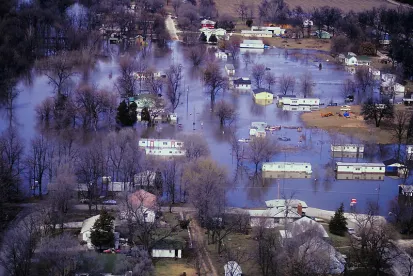The 2017 Hurricane Season will be long remembered. Hurricane Harvey will likely be deemed the most destructive and expensive natural disaster to impact the continental United States. Harvey made initial landfall on August 25, 2017, near Port Aransas, Texas, and continued to batter Texas for days thereafter. Harvey struck near Houston, the fourth-largest metropolitan area in the United States with nearly 6.6 million people and dumped approximately 52 inches of rain over parts of Southeast Texas, an area equivalent in size to the State of New Jersey. It is estimated losses will total between $160 and $200 billion.
Then, while authorities were still addressing the impact of Harvey, Hurricane Irma roared through the Caribbean Basin causing widespread destruction before making landfall in the Florida Keys on September 10, 2017, as a Category 4 storm. Irma then pushed its way up the entire length of Florida before being downgraded to a tropical storm. As of September 11, 2017, approximately 62 percent of Floridians were without power. It is estimated insured losses from Irma could total between $20 and $40 billion.
One of the issues that will certainly arise in the weeks and months ahead will be claims made by businesses that have been impacted by one or both of the storms. Moody’s initial estimate of damage related to Harvey indicated nearly a third of the total would involve damage to businesses and lost economic output. Similar to the Japanese earthquake and tsunami, the 9/11 attack, and Hurricanes Katrina, Rita and Sandy, the damage caused by Harvey and Irma will likely lead to an increase in coverage litigation instituted by businesses facing uninsured or underinsured losses. In addition, it is possible that errors and omissions claims against agents and brokers will be prevalent. Understanding the parameters of Business Interruption (BI) coverage is critical to managing policyholders’ expectations.
Business Interruption Coverage
BI coverage is meant to indemnify the insured against losses resulting from the inability to continue normal business operations. The coverage typically reimburses the policyholder for profits it would have earned but for the interruption of its business. There is generally a time element associated with any business interruption claim, and a reduction in earnings, less expenses not incurred, during a reasonable “restoration period” are covered. A reasonable restoration period is typically measured by the time it should take a diligent policyholder to restore property, but in no event to exceed a specified period of time designated in the policy.
BI coverage usually contains a requirement that there be physical loss or damage to trigger coverage. The loss or damage typically must be to insured property and caused by a covered peril. Named-peril policies specify the covered perils such as fire, hail, lightning, windstorm, explosion and vandalism. An all-risk policy will cover all direct causes of loss unless specifically excluded from coverage. Issues arise when two or more perils combine to cause a loss and one or more of the involved perils is not covered by the policy. In those situations, it is necessary to determine whether the policy contains anti-concurrent language that would preclude coverage when an excluded peril combines with a covered peril to cause the loss.
Identifying whether there has been physical damage to insured property caused by a covered peril is the first step in determining coverage. Additionally, the physical damage must causally relate to the suspension of business operations. A decline in the volume of business due to Hurricane Harvey or Hurricane Irma that is not related to physical damage will likely not trigger coverage, except as discussed below. Although wind loss is generally covered, most homeowners and commercial policies specifically exclude damage caused by flood. Separate flood insurance is available; however, coverage provided via the National Flood Insurance Program does not include business interruption.
Determining the “reasonable restoration period” following the interruption of business is essential to calculating the covered loss. Generally, coverage is extended only to the point where the damaged property is repaired or to the date when normal business operations resume, whichever occurs first. Factual issues often arise as to when repairs could have been completed or business could have been resumed. Calculating lost income is the policyholder’s burden to prove and involves more than mere speculation. Most often a business’s pre-loss history of sales, earnings and expenses is the measure of a potential loss. Issues will arise where a business has been in a pre-loss downturn or has not accumulated a significant enough history to reasonably forecast future earnings. An insured that fails to maintain proper records or who underreports income also may raise issues.
Extended Business Income Coverage
Hurricanes Harvey and Irma will undoubtedly generate massive losses to businesses that are not caused by physical loss or damage to insured property and therefore may not be covered by basic BI coverage; for example, a company located on the West Coast is unable to operate because of supply chain disruptions arising in Texas or Florida as a result of either hurricane. BI coverage can typically be extended to cover some types of anticipated losses via extra expense, contingent business interruption, utility service and civil authority coverage.
Extra Expense
Extra Expense coverage can be part of basic BI coverage or it can be separate coverage. Extra Expense coverage reimburses the insured for expenses in excess of the normal operating expenses during the period of restoration. This type of coverage is particularly critical in service-oriented industries − such as medical, legal and credit − that cannot sustain a period of suspended operations. Depending on the policy, relocation costs incurred, such as leasing new space and equipment and the restoration of damaged equipment, may be covered. Costs incurred in establishing the BI loss also may be covered.
Contingent Business Interruption
The impact of Hurricanes Harvey and Irma on airports, rail lines, ports, power stations, oil refineries, bridges and other infrastructure may lead to considerable supply chain disruptions. If BI coverage is extended to provide for Contingent Business Interruption (CBI), coverage may exist for businesses that are impacted as a result of physical damage to real or personal property of third parties in the policyholder’s supply chain. CBI coverage typically requires the cause of loss to the third party’s property to be a covered loss under the policyholder’s policy.
Utility Service
Large portions of Texas and Florida suffered power outages as a result of the storms and some may be without power for a considerable time. Utility service interruption coverage provides coverage for losses incurred due to physical damage to the property that supplies the utility, such as electric, gas and water. There is typically a time component requiring the service outage to last a minimum amount of time – usually 24 to 72 hours. As with basic BI coverage, the service interruption generally must result from a covered peril. Additionally, some policy wording excludes coverage for loss resulting from damage to overhead power lines.
Civil Authority
Many businesses may sustain losses in the aftermath of Harvey and Irma due to their inability to access their location as a result of an order by a civil authority. Also, many properties in the Houston area were damaged following a decision to release water from storm-swollen reservoirs. Standard homeowners and commercial property policies may exclude coverage for acts of civil authorities, although the specific policies must be reviewed in that regard. For coverage to extend to losses resulting from the actions of civil authorities, there generally must be physical damage caused by a peril to the area where the business is located. The action of the civil authority must be mandatory, as opposed to a suggestion, recommendation or request, and must completely restrict access to the property. Employees’ inability to get to work due to localized road closures or transportation disruptions would not be covered.
Takeaways
Hurricanes Harvey and Irma will undoubtedly result in a large volume of BI claims in the affected areas. Moreover, CBI claims may be expected from companies located in other parts of the country impacted as a result of the cessation of operations by those with whom they do business. Understanding the limits of basic BI coverage is critical when evaluating coverage for losses and for errors and omissions litigation based on the possible unsatisfied expectations of policyholders.




 />i
/>i
